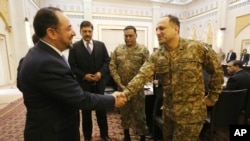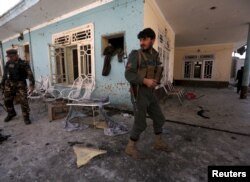Direct peace talks between the Afghan government and Taliban-led insurgent groups are expected to start “by the first week of March” and Pakistan has offered to host the negotiations.
The announcement followed a meeting Tuesday in Kabul of diplomats from Afghanistan, Pakistan, China and the United States as part of efforts to promote the Afghan peace process.
“The QCG [Quadrilateral Coordination Group] member states invite all Taliban and other groups to participate through their authorized representatives in the first round of direct peace talks with the Afghan government expected to take place by the first week of March 2016,” the QCG said.
The announcement added the next QCG meeting will take place in Islamabad "immediately after the first direct peace talks.”
Earlier, in a speech to the delegates, Afghan Foreign Minister Salahuddin Rabbani reiterated a call for the Taliban, the Hizb-e-Islami, and other armed factions to join the peace process.
The head of Hizb-e-Islami’s political wing, Ghairat Baheer, told VOA his group is considering Rabbani's invitation.
“We are seriously discussing it and considering it. Our preference is that Afghans should be allowed to settle their own problems by themselves without foreign intervention and foreign mediation. But since the new situation emerged, so we will be considering it again,” Baheer said.
Hizb-e-Islami is the country's second largest insurgent group.
Taliban reaction
The Taliban has not indicated whether it intends to join the peace process. Instead, the Taliban has intensified its insurgent activities and extended its control or influence to an estimated 30 percent of Afghan territory during the past year.
Rabbani emphasized the need for a “considerable reduction" in insurgent violence, among other confidence-building measures, saying it will help "our peace efforts to succeed.” He again warned that Afghan security forces are ready to deal with Taliban factions that refuse to join the peace talks and continue to commit bloodshed in the country.
A Taliban spokesman, when contacted by VOA, would not directly comment on Rabbani’s call for the group to join the peace process and referred to its stated public position that calls for withdrawal of all international forces from Afghanistan before starting any peace process.
The United Nations says the Afghan conflict continues to hurt civilians and documented more than 11,000 civilian casualties, including dead and wounded in 2015.
U.N. Afghan mission chief Nicholas Haysom emphasized the need for a political settlement to bring an end to suffering for non-combatants in Afghanistan.
“Without peace there is very low prospect of dealing not only with civilian casualties, but an improvement in the quality of life and in the economic opportunities of the nation,” said Haysom.
Persuade arms groups
Separately, Afghan President Ashraf Ghani appointed and introduced the new head of the High Peace Council in charge of persuading armed groups to end violence and join the national political reconciliation process.
The council’s new chief, Pir Sayed Ahmad Gilani, is a prominent Afghan jihadi leader who is respected by tribes across Afghanistan.
Former president Hamid Karzai set up the council in 2010 to assist the government in promoting peace and reconciliation with armed opposition groups.
But the panel, which consists of prominent Afghan religious and political as well as jihadi personalities, has failed to achieve a significant breakthrough amid growing demands for the council's dissolution to save critical state financial resources.
es.





